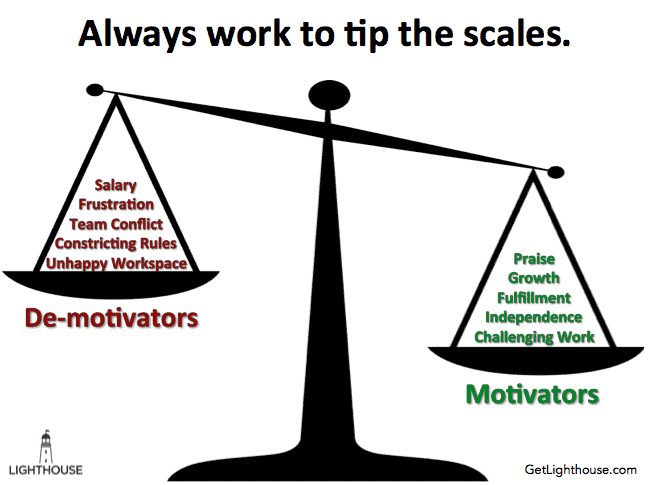"Forget this. I'm going home," I said to myself as I closed my laptop and packed my bags. I was frustrated and decided it was better to pick things up tomorrow than force myself through it for another hour after everyone else had gone home; this wasn't the first time, and wouldn't be the last.
While relief came in not thinking about it until the next morning, I was still annoyed the next day. Typing away at my computer working on it, it took longer than I would have liked, but I eventually finished because I knew it needed to get done.
Unfortunately, it came at the cost of other high-impact things I could have started that morning if I was fresh and enthusiastic.
This is an all too familiar story for many of us. Each week on the job can be a roller coaster of emotions from highly motivated and excited to frustrated and unproductive. No matter how hard we try, those feelings affect our work and how we interact with others.
The Hidden Cost of Motivation
Whether it be our own work or that of our teams, as managers, we're always trying to get more done. While the right tools can help, often the greatest gains come from investing in better motivate your team. Like the story above, those positive and negative feelings can greatly change the quality and quantity of work your people get done. It's well worth the investment to make someone happy.
So what are those drivers?
The 10 Crucial Drivers to Motivate Team Performance
We are complex, social creatures. Unfortunately, this means there is no single, silver bullet to motivating others. Instead, we have drivers that can either increase our motivation or slow and de-motivate us.
As research on Harvard Business Review by Frederick Herzberg teaches us, what crushes people's motivation is totally different than what gets them excited:
- What de-motivates them is, "an annoying boss, a low salary, an uncomfortable work space, or stupid rules. Managed badly, environmental factors make people miserable."
- While what motivates them is, "interesting work, challenge, and increasing responsibility. These intrinsic factors answer people's deep-seated need for growth and achievement."
Working in startups for much of my career, I've seen this paradox played out every day.
The Startup Motivation Paradox
Startups bring interesting, challenging work to their team members. Everyone has tons of responsibility and independence. However, they also often have very inexperienced managers, lower salaries, and, as the company grows, more constricting rules and processes that can be frustrating.
Often, problems can fester and eventually the bad outweighs the good, as work becomes more narrow, focused, and incremental. This is why people that love working at a startup at 20 or fewer employees often feel out of place and unhappy at the same company with hundreds of employees. It's also how bad enough management can drive people away at early stage startups, regardless of autonomy and growth. You can tell similar stories for larger companies as well, when a new project starts out exciting and then grows and constricts or gets cancelled.
Regardless of company size, these motivators and de-motivators are on two sides of a scale that you will always be trying to lean in your favor:
Psychology works against us.
It's hard enough thinking about trying to tip the scales in a difficult environment to keep your team happy and productive, but the way the human brain works makes it even more difficult; the chemicals released in the brain for negative emotions last significantly longer than those for positive emotions.
When we have a happy moment, like praise from a colleague or work that we enjoy, it releases dopamine, which lasts in our brains for a significantly shorter time than the negative counterpart, cortisol, which can linger for over 26 hours. As a manager, you're always fighting an uphill battle.
Knowledge is Power.
Knowing these are the key drivers, you as a manager can do a lot to help. The more you can relieve those depressing, demotivating issues and outweigh them with the motivating factors of growth and achievement, the more motivated and engaged your team will be. You can also praise them, which reinforces the right things you want to see more of.
But when do I have time for this?!?
With everything you have going on as a manager, there's no way you can anticipate these issues. You have to stay organized and you have to ask; most people will not just immediately volunteer a perfect list stating, "This is what makes me happy, and this is what demotivates me at work." Instead, you have to create opportunities to discuss them regularly and there is no better time than your one-on-one with them.
Make the most of your one-on-ones.
Only having one-on-ones once a month (if at all)? Spending most of each one-on-one on status updates? Then you're missing out on crucial opportunities to tip their scales of motivation in your favor. You need to make one-on-ones about your people and often enough that you have time to talk about what bothers and motivates them.
If you're not sure where to get started with those discussions, look at the 100+ one-on-one questions here that will help you get feedback on you, the team, or your company, which could all reveal their frustrations, as well as questions on their goals and growth.
Motivation is Your Secret Weapon.
Think back to the last time you were really excited on the job. What were you doing? How did you feel? How much work did you get done that day compared to an average day?
Now imagine your whole team feeling that way all week long.
How much would your team be able to accomplish if that was always the case? Would you still need to hire more help for your team? Would that project be delayed another few weeks or would it be finished?
If you can unlock the motivations of your team and save them from the sea of de-motivators, you will unlock the power of the multiplier mindset as a manager.





